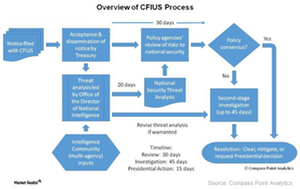Broadcom Didn’t Convince CFIUS to Approve the Qualcomm Takeover
A day after CFIUS began its review, Tan visited the senior members of the government agency to discuss the matter.
April 10 2018, Updated 7:30 a.m. ET

CFIUS cautioned Broadcom
In the previous part of this series, we saw that the Committee on Foreign Investment in the United States (or CFIUS) raised concerns that the acquisition of Qualcomm (QCOM) by Singapore-based Broadcom (AVGO) would lead to national security concerns. Broadcom tried unsuccessfully to ease these concerns.
Broadcom announced plans to relocate its headquarters to the US in 2017 when the company’s CEO, Hock Tan, visited President Trump at the White House. The company recently accelerated its relocation efforts in order to complete this process before the CFIUS concluded. If the company succeeded in doing so, its Qualcomm deal could have been out of CFIUS jurisdiction, as it would no longer be a foreign investment.
However, CFIUS issued a letter that alleged that Broadcom violated the government order by relocating its headquarters without giving it a five-day notice, reported CNBC. The agency stated that this was the third time that Broadcom has violated government requirements.
Broadcom appealed to CFIUS
A day after CFIUS began its review, Tan visited the senior members of the government agency to discuss the matter. According to news reports citing people familiar with the meeting, Tan explained that the Qualcomm deal would only be good for US national security as Broadcom would move forward with the deal only after it redomiciles to the US.
Responding to Tan via letter, the US Department of the Treasury noted, “In the absence of information that changes CFIUS’s assessment of the national security risks posed by this transaction, CFIUS would consider taking further action, including but not limited to referring the transaction to the president for decision.”
The agency did just that and on March 12, 2018, President Trump issued an executive order to block the deal.
The basis for the executive order to block the Broadcom–Qualcomm deal
Trump stated that he based his decision to block the Broadcom-Qualcomm deal on the CFIUS assessment that Qualcomm’s leadership in next-generation 5G technology is critical for national security. The Hill, citing a White House official who wasn’t authorized to speak on the record, reported that Trump’s decision was influenced by Broadcom’s “relationships with third-party foreign entities.”
Moreover, Trump’s decision wasn’t made because Broadcom is based in Singapore. It was made because the Qualcomm deal posed the risk that China (MCHI) could move ahead of the US in 5G technology. So, Broadcom’s redomicile to the US didn’t move the needle for CFIUS and Trump.
Trump’s executive order raised questions about the extent to which his administration would be willing to intervene in private-sector decisions. We’ll look into this issue in the next article.
